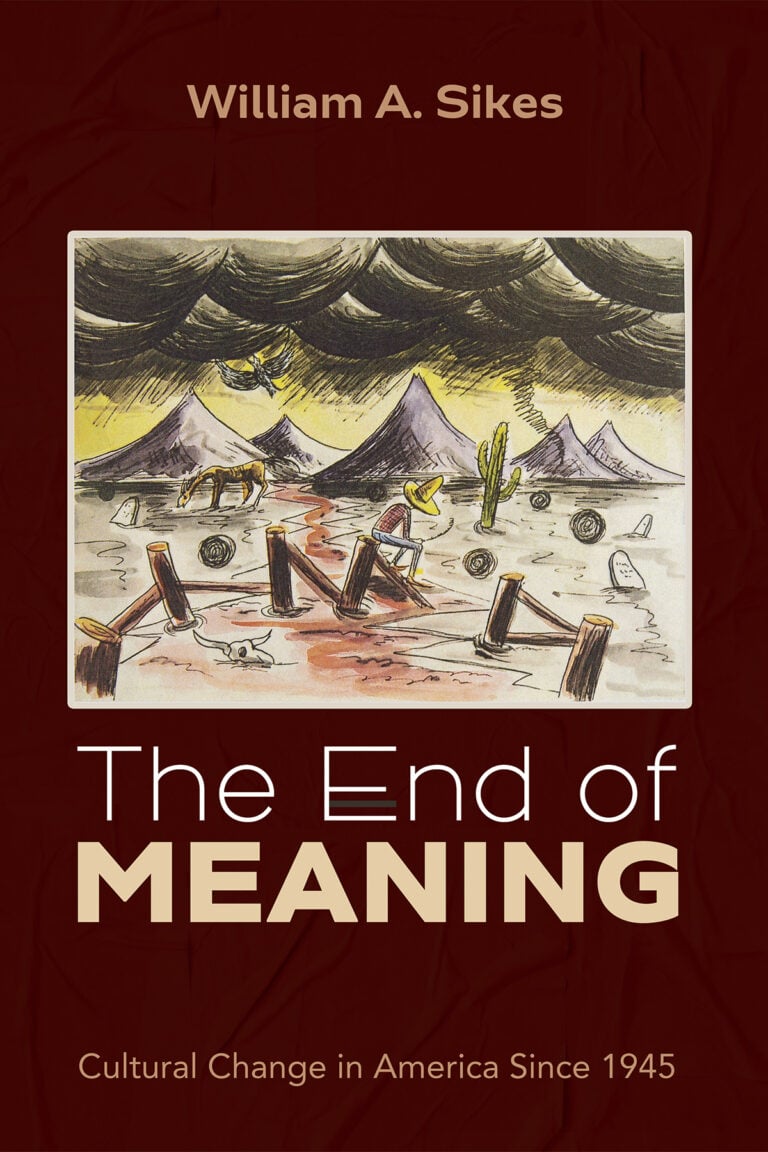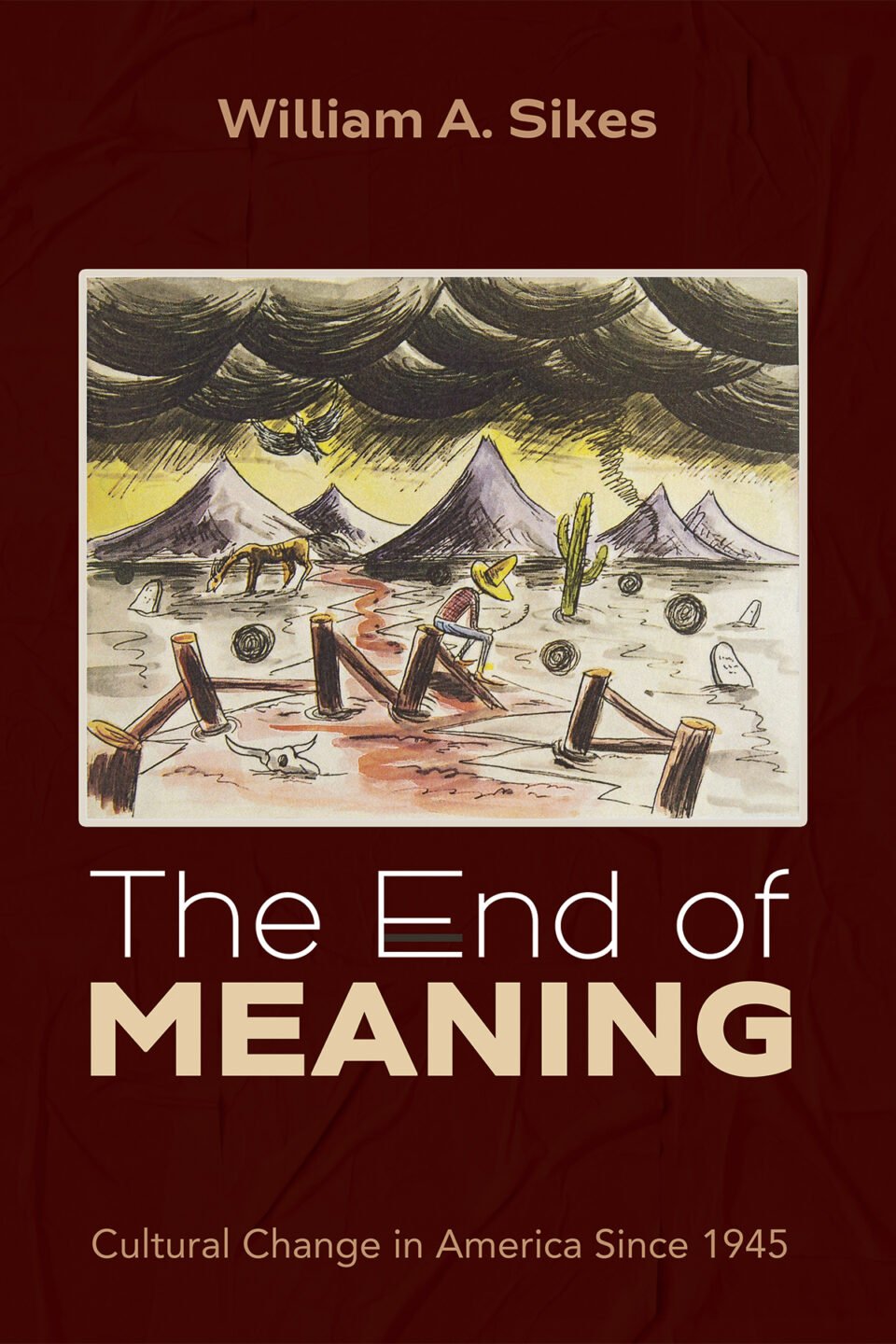William A. Sikes’s THE END OF MEANING: Cultural Change in America Since 1945 is a treatise on the state of American society. A main theme is that today’s Americans have lost their ability to dream. By this Sikes refers to the assignation of meaning to our lives: in recent decades, a persistent emphasis on individualism, the hollowing-out of societal institutions (including family, religion, the arts, and the workplace), computerization, and the sexualization of society have all conspired to rob people of meaningful lives.
Sikes diagnoses societal ills such as “self-absorption,” what he describes as “today’s epidemic of ‘overparenting,’” and the decline of religious belief. Much of the book is sensible and compelling: it is fair to criticize the vulgarization of entertainment, the decline of manners, the culture wars (though he never describes them as such), and so forth. He does not exactly offer solutions, recognizing the absence of an easy panacea. Instead, he rues the disappearances of the pillars of community, insisting on religion as a moral compass and driver of progress (“When calls for social change emerge outside religion and are accompanied by attacks on America’s character and her past, the possibilities of meaning narrow”).
Community, religion, and the traditional family can, of course, impart meaning. But they do so in very different ways, and to hugely differing degrees. One obvious fault with Sikes’s thesis is that he frequently handwaves problematic aspects of these phenomena. He laments the passing of the “traditional family,” suggesting that “it’s hard to imagine any arrangement better suited to serving the needs of children than the family of old.” From one perspective, the merits of this are self-evident. The family unit continues to offer the most efficient way of providing shelter and support to both children and older family members, and as Felipe Fernandez-Armesto pointed out 30 years ago, families will continue to endure for that reason. Unfortunately, Sikes’s view is rose-tinted to the point of folly. He cites statistics detailing the supposedly higher levels of happiness experienced in marriages during the 1950s and the rise of the “companionate marriage” as key to this outcome, but has nothing to say about the effects of children witnessing (or suffering) domestic abuse—a profoundly damaging experience that was under-reported in the US and, though not endemic, was certainly common enough in the 1940s and 1950s to require sleights-of-hand by social commentators. This included describing it as a husband’s foible, or attributing it to the spurious concept of “female masochism.”
Sikes is similarly dewy-eyed when it comes to work. He seems genuinely mystified that today’s young workers “seem to care only for the financial rewards” of working. Well, of course they do; what else constitutes an appropriate reaction to work when so many of today’s positions are what David Graeber (in his celebrated 2018 volume) called “bullshit jobs,” which were meaningless and unfulfilling almost by design? “Neither the intrinsic value of their labor nor the possibilities of meaning through on-the-job relationships motivates them,” Sikes continues. “They simply expect to show up, do the necessary labor, and be fairly compensated.” Work can be something more than that, certainly. But it does not have to be, and for millions of twenty-somethings, it simply isn’t; they seek out meaning elsewhere. Sikes does suspend judgement, but ultimately fails to investigate the reasons behind this trend. Elsewhere he cherry-picks, bemoaning the “abusive atmosphere” in the sports that he claims have taken the place of religion in society, including physical and sexual abuse by trainers and coaches, but has nothing to say about the myriad abuse cases uncovered in recent decades in countless churches across the US.
Ultimately, THE END OF MEANING is a call for a return to the good old days when the nuclear family prevailed, everyone stood for the flag, and the Bible could be heard in every classroom. But the trouble with saying how much better things were “back then” is that, almost always when one hears this viewpoint, it is invariably doing duty for the sentiment that things were better for the speaker. Sikes is right to call our attention to today’s societal depredations, but his elegy for the post-war period protests far too much.
William A. Sikes’s THE END OF MEANING: Cultural Change in America Since 1945 presents interesting and thought-provoking ideas, though it reaches too far in its lionization of American society during the immediate post-war period.
~Craig Jones for IndieReader


